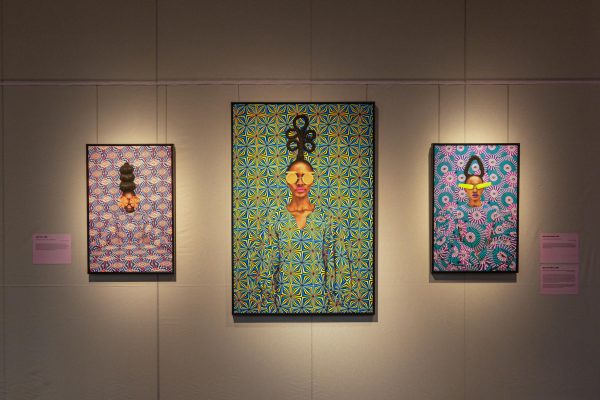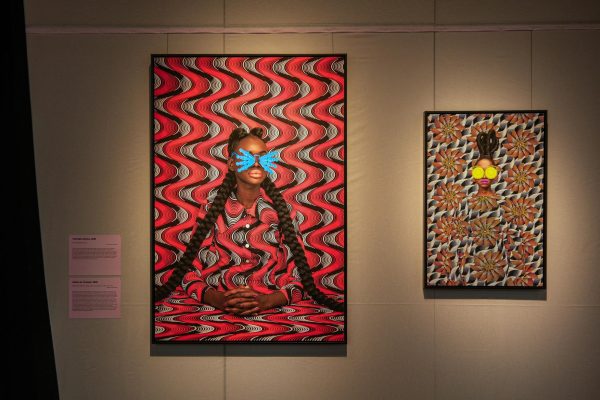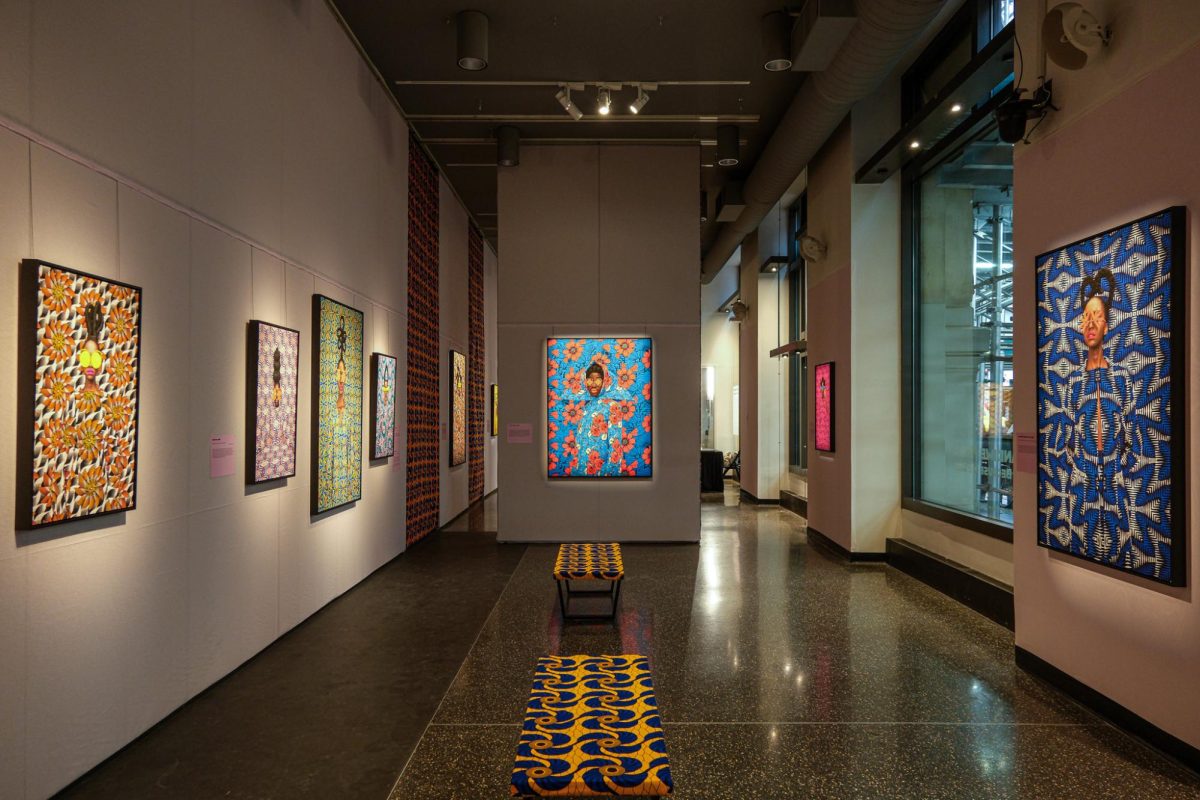Featuring vivid cultural textiles, eclectic accessories and elaborately constructed hairstyles, artist Thandiwe Muriu’s photography plays with concealment and exposure. To accomplish this, the photos center colorfully patterned fabrics and uniquely incorporate household objects.
Muriu, a self-taught photographer from Nairobi, Kenya, explores identity by reinventing expectations of womanhood and merging respect for tradition with modern innovation. She accomplishes this by searching for African textiles in Nairobi’s fabric shops, reimagining historical hairstyles and incorporating eyewear that pays homage to the repurposing of everyday objects in Kenya.
On view at the Gallatin Galleries, Muriu’s exhibition, “Thandiwe Muriu: I Am Because We Are,” is curated by professors Keith Miller and Lauren Walsh of the Gallatin School of Individualized Study. The plaques alongside Muriu’s photographs in the gallery contain written African proverbs, one of which is the namesake for the exhibition. The idea of “we,” a pluralistic inclusion of identity, is embodied by each subject of Muriu’s photographs, highlighting the ancestral and historical sacrifices of women as well as the victorious reclamations of female empowerment today.
In the photographs, the models’ patterned clothing is identical to the portrait’s backdrops. The clothing, at the forefront of the photograph, blends with the fabric at the back of the composition, rendering the depth of the space indiscernible. The result is a fluid, two-dimensional optical illusion, intensified through the flamboyant colors and rich textures. The photographs become more coherent when the viewer focuses on the models, who are starkly three-dimensional against the smooth patterning. Bold lipstick, contoured skin, eccentric eyewear and grand hairstyles draw attention to the models and ground the viewer.
“The Power of Together” features a tangerine orange fabric, patterned with an abstract floral design of black teardrop-shaped petals inlined with white polka dots. The model wears magenta lipstick and yellow eyewear constructed from drinking straws. Her hair splits into five sections extending outwards and curving into swirls at the top, like the rays of the sun. Her hands are horizontally clasped and the proverb alongside reads, “It is not only giants that do great things.” In this photo, Muriu investigates women’s invisible labor — specifically, the unending expectation to prepare meals. “A mountain of highly relished pillowy dough called ugali is mined by hands both big and small,” the plaque reads.
Muriu’s artistic choices — the warm-toned, fiery shades, billowing patterns and joined hands — reflect this communal preparation of meals and imagines a crowded kitchen brimming with aromatics, warmth from cooking steam and helpers trying to steal a taste. “The Power of Together” is Muriu’s visual celebration of underappreciated work traditionally assigned to women and recognizes the ancestral strength of one’s community.

The backdrop pattern of “Beyond Birth” is made from concentric circles divided radially. The sections are colored in alternating turquoise, navy blue, fuschia and white. The eyewear is constructed from two yellow rubber doorstops, covering the model’s eyes and extending outward above her cheekbones. She wears violet lipstick and her hair is woven into a complex plait that molds into a rounded triangle above her head. The proverb reads, “The sky is wide enough for two birds to fly without their wings touching.”
These words, along with the artistic elements of the photo, encapsulate motherhood’s connection to female identity. Historically, a woman’s worth was based on the number of children she has, according to the plaque. The description further explains how in Kenya, even clothing links a mother’s identity to her children, who will dress in matching fabrics. The circular motifs in the patterning of “Beyond Birth” resemble piercing stares — a nod towards the photograph’s themes of personal rediscovery and honest reformation of expectations. Circles also relate to wholeness, representing the full spectrum of experiences and interactions that construct one’s identity. With this photograph, Muriu honors motherhood while recognizing that a woman’s completion and worth are separate from her child-bearing abilities.

“The New Africa” features a pattern of oscillating, synth-like waves in red, black and white. The model wears a button-down shirt with a wide collar and her hair is styled in two long braids expanding on either side of her body. Wearing coral lipstick and eyewear constructed from sky-blue clothespins, the model sits self-assuredly with her hands clasped on the fabric-covered tabletop, nails painted maroon. The proverb — “I am because you are” — mirrors the gallery’s name, and the photograph itself represents the essence of Muriu’s collection and her artistic interweaving of the past and future.
In this piece, Muriu’s pattern selection mimics science-fiction elements, including modern silhouettes and patterns evoking technological reverberations and daring innovation. The plaque describes the “new Africa” and references African youths’ hybridization of inherited and digital influences, ultimately reinventing culture at large. This photograph emphasizes modernization, incorporating historic textiles and bold hairstyles that play with tradition. Muriu’s contemporary reimagination of beauty plays into African modernism and Afrofuturism, paying homage to tradition while looking toward a new cultural horizon.
In “I Am Because We Are,” Muriu situates each photographed woman and the social phenomenon the artwork represents as a singular glimpse into a multitude of narratives. Her diverse artistic style blends pop art and realism, antiquity and modernity, and repetition and stochasticity. Such is the plural nature of womanhood — discovering identity within a cultural context, transcending timelines and rewriting narratives.
“Thandiwe Muriu: I Am Because We Are” is open to the public, free of charge, until March 3 at the Gallatin Galleries.
Contact Sydney Chan at [email protected].
























































































































































